News topics
Monthly Newsletters
// //// //// Online Booking //
// //// // // // // // //
For group bookings please contact
017687 77246 or
contact@derwentwater.org
York Outdoor Group, Jan 2018.
Schools
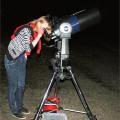
As many of you know, our dining room is very versatile. In early December 2013, our two favourite Astronomers, Andy Green and Dennis Ashton, returned to give an Astronomy masterclass to some pupils from Appleby Grammar and installed the Stardome Planetarium in the dining room. Have a look at the Stardome website if you are interested in booking the planetarium: www.stardomeplanetarium.co.uk
One of the pupils kindly wrote a report on their science residential at the hostel. ‘As part of our GCSE Physics course the Year 10 Separate Science class went to the Derwentwater Independent Hostel near Keswick to go through an Astronomy Masterclass given by two experienced astronomers. This was a great opportunity for active learning instead of doing this part of the syllabus in class. Our first talk was on meteors and after lunch my group first had a talk by one of the astronomers on the life and death of stars. We learnt an extraordinary amount during all the talks. We were absolute novices at the beginning of the course. After this talk, we swapped and my group went into a fabulous planetarium where we learnt all about the stories behind the constellations and more about the night sky.
After a short break it was straight back into the action again with another talk on theories about the universe over time, and current theories about the beginning and end of the universe. Some of us struggled to get our head around the idea of before the big bang, where there was no time and nothing, not even emptiness. However, we enjoyed the talk all the same as everything was really interesting.
After dinner we all went outside in the hope of seeing all the stars which we had learnt about during the day. Unfortunately, there was just one thing stopping us…clouds. After a quick tutorial on how to use a telescope we all saw some houses in Keswick (not what we were expecting!) and then it was back inside- not a single star seen.
For the whole of the second day we were in groups of 5/6 and we were making a short presentation on a proposed base on Mars which we were designing. We had lots of issues to think about which were given to us in a talk first, and then everyone got to work. Every group’s posters were excellent but one had to win, which was a group who had looked at colonising Mars in the future (David, Jack, Alistair and Owen).
Overall, this trip was a fabulous opportunity and experience which we all enjoyed. The two astronomers were great in making the learning materials and presenting them, and also for showing us their great telescopes and planetarium. It was certainly better than two days of school.’ (Next year the hostel staff are going to down tools and join in the masterclass – we’ll learn a lot).
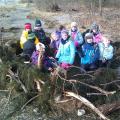
What an action packed week the Juniors of Ireby C of E School had for their residential in February. There are many benefits in having a school trip early in the year and these children had an incredibly varied programme, including a geography themed day to Watendlath, looking at rivers and doing map work. They made good use of our grounds too with creative time spent on environmental sculptures.
Another day they visited the Lodore Falls to read Southey’s ‘Cataract of Lodore’, and explored the Lake shore, investigating the woodlands and made their own shelters for a picnic stop. In the evenings, their activities ranged from a night walk and games in the dark, a fascinating and informative talk on local birds and mammals, toasting marshmallows around a camp fire, a talent show and an evening at the Theatre by the Lake to enjoy the Local Junior Musicians Concert.
For many of the children, the highlights of the week were the sessions with the Glaramara Centre including climbing, orienteering and the overwhelming favourite ‘ghyll scrambling’. One of Ireby’s leaders told us about their last day ‘We headed up to Honister Beck and began a fantastic ascent of the ghyll and managed some great personal achievements in climbing up waterfalls and over rocks, through tunnels and helping each other as a team to reach the top in very high spirits. The last activities were archery and tree climbing. More personal achievements and limits were pushed and a very rewarding and fun day brought the end of the week long residential to a close.’
Feedback from the children included the following: ‘My favourite day was Friday because we went climbing up waterfalls and we did archery, it was so fun’ Hannah.
Finn told us ‘I loved all of the activities but ghyll scrambling was really fun.’
The children gave the hostel their seal of approval too with Philippa telling us ‘Derwentwater Youth Hostel was amazing, with delicious food and wonderful staff who make you feel at home.’
If you would like to read the full account of this residential, please get in touch and we’ll email you a copy.
February 2013.
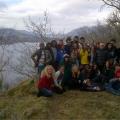
Back in May 2012, we had a nice email enquiry from a school about a booking for April 2013 as part of a literature trip. Nothing unusual about that you may think but the enquiry was for Cedar House School, Cape Town, South Africa, who were starting to plan an amazing 2 week trip for a group of about 40 of their students. Rather than book everything through a tour operator, Cedar House decided to tailor make their 2 week tour and booked everything direct.
Eleven months and lots more email correspondence later, Cedar House School stayed at Derwentwater for 3 nights. We were delighted to be their chosen base for the Lake District. Highlights of their Lake District visit included a morning at the Wordsworth Museum at Grasmere and their overwhelming favourite visit was to Beatrix Potter’s House at Far Sawrey. They had some scenic trips to take in the Lake District landscapes including a trip around Derwent Wateron the Keswick Launch and a visit to Buttermere.
Cedar House also visited Bronte Country (Haworth), Edinburgh and London as part of their tour and were lucky enough to go to an RSC production in Edinburgh. The students ranged in age from 13 to 18 and seemed to really appreciate the wonderful trip their school had organised for them. We are pretty sure that they must be the school who have travelled the furthest to come and stay here. Their visit coincided with a very late wintery spell of weather in the UK after Easter, so they left Cape Town in temperatures of 25 degrees to land in London to a frozen landscape!
One of the school staff told us about their stay at our hostel: 'It was undoubtedly an unforgettable and most memorable experience. The hospitality, the food and the accommodation was top class and our students were very sad to leave one of the most beautiful places on this planet'. Thank you to all of the Cedar House School Party for being such lovely guests. We all think the Lake District is very special but it’s fantastic for our international guests to place it in a world context!
April 2013.
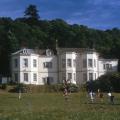
Newbarns School in Barrow-in-Furness have been coming to the hostel every year for 17 years, so they really are old friends! As usual they bought a group of Year 5 pupils, as well as staff and helpers. When asked to contribute something to this newsletter, their teacher, Mark Laird, very cannily handed the task over to three of the pupils, Aimee, Logan and Chloe. Together they wrote the following piece, which I think you will agree is beautifully written with plenty of detail and a soupcon of wit!
'On the 8th of May, we went to Derwentwater Youth Hostel. The rooms were amazingly clean and tidy but they weren't very clean when we were finished with the rooms! We all had great fun on the bunk beds and there was plenty of space to have a midnight feast (shhhhhhhh don't tell the teachers!) We thoroughly enjoyed the amount of grassland that was provided for us to play on, plus the woodland was great to play in and make dens out of sticks. The food there was unbelievably divine and it had amazing quality. I had the spag bol and it was gorgeous. Overall though, I think everyone's favourite was breakfast; a brilliant English breakfast. We all loved it. The sausages were very popular and the bacon was as well. The food was 10 out of 10!
We were able to play many games in and out of the hostel including: the world's 2nd most famous hide and seek, capture the flag and seeing how many sweets we could fit into our mouths. (Again, shhhhhh!) This trip was a brilliant time to get to know our friends and the teachers, we really enjoyed it and we would love to come again. It would not have been fun if we were naughty.
We went on the ferry across the beautiful lake, only some of us enjoyed it because the people on the front deck got SOAKED!!! The walk we went on took 5 hours! We were all exhausted when we came back. I went straight to sleep. On the walk we stopped and enjoyed the food and drink from the cafe. It really warmed us up on the coldest walk of the trip. Before the cafe we saw Surprise View where you can see for miles and miles and miles. But when we got to the hostel we got warm and dry again. We all enjoyed the table tennis, pool and the table football. We all would love to come again and have some more of the marvellous food. From the happy Year 5.'
I don’t think there is anything to add to that except well done and thank you to Aimee, Logan and Chloe!
July 2013.
We were really pleased to have a new group to stay with us in April - a group of over 50 Year 3 children from Ashfield Junior School, Workington, Cumbria. Year 3 children are in their first year of junior school and aged 7 & 8. Ashfield have a great residential programme for their children and booked a 2 night visit for these pupils for their first school residential. You may be interested to learn that Cumbria is a very large county – in fact it has the second largest county council area in England but has the second lowest county population density, with only 5 towns with more than 20,000 residents, including Workington.
Although we’re not far from Workington, it was still a big adventure for the Year 3 children to come away for 2 nights. It was a bit too daunting for a few children who joined in for daytime activities only, but that’s the beauty of staying in the same county. The Staff from Ashfield were brilliant and made the trip a lot of fun and the children were soon at home here and very confident and happy. They used our grounds to do a variety of activities and spent their last day at Whinlatter Forest before heading home. Next year they will go further afield on their Year 4 residential to Scotland.
It was lovely to get feedback from the children and be reminded about what they like and what’s important to this age group.
'Thank you for making us so welcome at Derwentwater Youth Hostel. We all had a fantastic time, my favourite part was eating the British bacon for breakfast.'
'Thank you for making us so welcome. Everyone in the Youth Hostel was very friendly and kind. I enjoyed sketching the waterfall and watching the wildlife in the gardens.'
'We all had a great time. I loved the view from my bedroom window, we could see the forest.'
'My favourite meal was breakfast...the sausages were divine.'
'I loved my room and the bed was very comfortable.'
'We loved making dens in the grounds.'
'I'd like to say thank you for the epic time I had at Derwentwater Youth Hostel. Room 4 was a great room.'
'My favourite activity was making a den because we had to climb over logs and stuff!'
So well done to the Year 3 Staff at Ashfield Juniors for successfully introducing these youngsters to school residentials and we’ll really look forward to you bringing another group to stay in 2014.
We were very pleased to see our old friends Ormiston South Parade School from Grimsby who have been coming to Derwentwater Youth Hostel since 1990. What sets Ormiston apart is that the trip is mainly planned and organised by a team of volunteers which includes teaching assistants, parents of former pupils and sometimes former pupils themselves. To keep costs down they also have the help of external sponsors, such as Grimsby College who provide a funded mini-bus each year. The team’s dedication and enthusiasm to make a memorable visit for the journey never seems to dwindle. This year they brought 23 energetic eleven year olds.
Their programme consists of some quite impressive walking routes, which are fully assessed to stretch the children so that the children gain a great sense of achievement when they complete them. On the first day they walked all the way to the top of Fleetwith Pike overlooking Buttermere, and on the second day they walked up the steep, stepped path to King’s How and from there down to Watendlath where they had refreshments at the cafe. One boy was rather underwhelmed by the second day’s route, declaring that he 'expected life or death experiences in the Lake District'…!
The children also had fun ghyll scrambling and testing their nerve on high ropes, with team-building games and activities taking place after an early tea. Their evenings were busy and fun-packed too - on their second night they went to the Lakeshore and cooked sausages and toasted marshmallows, and on the night before the Summer Solstice they went to Castlerigg Stone circle to experience some local heritage and found themselves joined by druids and other revellers!
It was lovely to see the staff and children all enjoying themselves so much and making the most of a fantastic spell of glorious weather. One of the children declared ‘this has been fantastic! I want to come back for my school reunion!' Karen Bacon, teaching assistant at Ormiston, and one of the voluntary organisers, says that it is this kind of feedback 'along with the noticeable change in pupils through the week is all the reward the hardworking volunteers need.' She goes on to say, 'Many ex pupils have related back the difference that these trips made to them as part of their preparation for senior school. The unique combination of the Derwentwater Youth Hostel and the blue print of the Ormiston South Parade activities makes a genuinely memorable, learning and development experience for pupils.'
We think the team of volunteers are to be applauded for their commitment and hard work in ensuring this annual event happens and works so successfully.
June 2013.
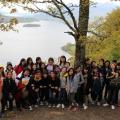
To add to our ever-growing numbers of overseas’ visitors, last month we had 35 students from Nayang Girls High School in Singapore. They were here on an 8 day tour of England, starting in the Lake District and then going on to York, Cambridge and London. With a roll call of 1700 pupils, places on the tour were like gold-dust so each student had to apply, saying why they should be given a place on this special trip.
During their visit to the hostel they went on a walk to Surprise view and from there to Keswick, accompanied by our volunteer Katy. To some of the girls, the uphill walk to the viewpoint was like climbing a mountain, as they had never experienced anything like it before. The girls wrote journals and the teacher sent us this moving piece by Chang Yi Lin, aged 16, which really gives an insight into the profound impact their visit here had on the students:
'Although we all shared one big room and had to sleep in bunkbeds (I slept on the lower bunk and because the 'ceiling' was so low, I bumped my head almost every time I get out of bed), the view was AWESOME! And it was really fun staying in the same room as everyone.
Although the weather was quite temperamental - rainy and windy, making the trek quite tiring - it was overall an enjoyable and satisfying experience. Firstly, the view was ABSOLUTELY AMAZING! The clear waters, lush green trees, jade green mountains in the distance, everything was just paradise. It made me remember how much I loved the beauty of Mother Nature. Caught up in the fast-paced lifestyle and high end modern society like Singapore - all modern glass and steel buildings, crowds, stress from daily life, schoolwork, deadlines - often we lose ourselves among the chaos.
Surrounded by the natural beauty of Mother Nature, I was overwhelmed by the feelings aroused within me; this warmth and bursting joy within me, which pictures can never replace - the serenity, the tranquillity. I felt released, relieved, refreshed physically and mentally as I stood silently by the gravel shore, beneath the outspread branches of a bending tree, just looking out into the wide lake, clear skies, the mountains and trees. Just standing there, breathing in the fresh cool air, watching the trees sway with the wind, the ducks dancing in the waters, the birds chasing each other in the wide blue sky, I could never feel happier.
I think for people like us, living in busy cities like Singapore, it is essential for us to find time to go back into the arms of Nature, to rewind, recharge, to learn to slow down our footsteps and enjoy life, to live it.'
Sandra Yeng, one of the teachers, also emailed us to say:
'We felt privileged to have enjoyed the first two days of our tour in Derwentwater Youth Hostel and Keswick. The beauty of the property, lake and town, the lovely conversations with the other guests, and the charming hospitality of Kathy, Katy and the rest of the staff gave our students a great taster of English countryside - we think some of them will yearn for such respite when city life in Singapore gets to be too much. Thanks, Kathy and your staff, for going the extra mile to keep our 35 teenagers comfortable, healthy and happy!'
I think all of us here feel somewhat humbled and privileged to think that the place where we live has such an overwhelming effect on people from the other side of the world.
June 2013.
Lutterworth High School in Leicester is lucky enough to take a week off timetable at the end of May in order to participate in a wide range of trips and specially designed courses. These take place as far apart as Paris and South Africa, with the students fundraising to cover the cost. Their visit to our hostel is the only UK-based residential that they organise and they return every year with a new group of students drawn from Years 8 and 9.
Assistant head teacher, Dick Salter, was kind enough to write up an account of this year’s visit to the hostel:
'The students’ prior experience of outdoor activities is broad - some have never done a full day’s walk whilst others are seasoned campaigners! The students benefit enormously from the week and enjoy sharing the rooms and dining room tables and activities with students from other year groups. The hostel at Derwentwater is close to perfect for our needs - the hostel and its grounds are huge and every year they use them in a different way - some years it’s football; some years it’s cricket on the front; in other years groups have insisted on repeated visits to Ashness bridge in their spare time. And if it’s raining the hostel can easily swallow up 50 students playing pool and table tennis.
We use Keswick Adventure Centre to run the activities: the range they provide is fantastic for our students who do canoeing and raft building on the lake, mountain biking up Latrigg from Keswick, and ghyll scrambling at Stoneycroft Ghyll in the Newlands valley. The highlight for many is the Via Feratta at Honister and many of our students grow in front of our eyes as they master their fears.
The teachers on the trip see students in a new light, and although we are experienced leaders of trips we are not especially active, so we have to face the same outdoor demands alongside our students, which means we grow together! This is all possible because of the experienced staff at both the hostel and the adventure centre. And leaving the best till last – THE FOOD…!'
Katie, from Year 8, gave this review of their visit: 'I think what made it for me was my group that I did all the activities with, because we all made friends and it didn't matter if we were in different years we all just got along anyway. I definitely made some new friends that I wouldn't have expected to make. I loved the Via Ferrata - it was amazing! Even though some bits were terrifying, it was great because the people who were around you whilst you were climbing on the side of the mountain, you could talk to and laugh about how scared you were.'
Dick is not the first teacher to mention how teachers and students see another side of each other, and what a bonding experience residential trips and activities can be. Personal growth and development of their students is hugely important to a great many schools and it is so uplifting to think that our hostel can play a part in that process.
June 2013.
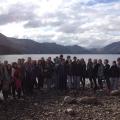
This month we had a visit from a group of Year 10 Seaham School GCSE Geography students from the North East of England. Seaham School, who have been visiting us for over 10 years, usually come in July, but the teachers have decided that it is better to get the coursework done earlier in the year. As the success of their activities testifies, the March visit seems to have been a good decision!
The students were here to work on their Controlled Assessment Unit, for which they were studying Tourism in the Lake District, and to look at River Studies, bringing their classroom learning to life.
The group also took part in team-building outdoor activities such as Ghyll Scrambling and Raft Building. Many of the students were nervous, but they cheered each other on, and their confidence increased dramatically. Ghyll Scrambling seems to have been the general favourite, even though the water was freezing!
The Seaham teachers emphasised the importance of residential trips for their pupils, from the value of learning outside the classroom, to the opportunity for students to stay away from home without their parents for the first time. A trip such as this, even within a half-day drive from home, broadens their horizons, with the students gaining many new experiences. They even recorded the educational value of the trip with a scoring system, each day asking for a score out of 10 to the question ‘how important is this field trip to your studies?’ The scores simply got higher and higher throughout the week.
The students themselves told us what they thought of the trip:
'The trip has helped me learn things I would never have learnt in the classroom. It was an amazing trip.' Yasmin Brown.
'I like the hostel as they let us have our own space and I enjoyed meeting new people. Overall the trip was amazing.' Hannah Jobling.
'The trip has pushed me way out of my comfort zone. The water sports were challenging but I loved every moment of it! I wish I could come back again!' Eleanor Weir.
We really enjoyed having Seaham School to stay with us. As always, the teachers were friendly and chatty, and the students were very well behaved. Their visit has given us a great start to the main school season.
March 2014.
The Ipswich School Geographers are a really impressive bunch: for five days of their Easter Holiday they followed a remarkable itinerary, with each day looking something like this:
08.00: breakfast
08.30: pre-excursion preparation (theories, background information, and planning)
09.30: hypothesis testing and data collection in a variety of environments (all day)
19.00: evening meal
20.00: tasks and write-up related to the excursion
21.00: discussion, presentations, and briefings for the next day
22.00: sometimes they were still working…
22.45: and so to bed!
The excursions included the following studies:
A study of glaciation in Borrowdale
- Surprise View (half hour walk from hostel): geological controls on ice erosion
- Watendlath: rock bar and diffluence channel
- Rosthwaite: the How, former lake bed, and moraines
- Borrowdale: ice marginal channel (side of Castle Crag), hanging valley and Lodore Falls
River and melt-water study
- Study of the Swindale Beck and Sink Beck
- Delta, kame and melt-water channels of the Pennine Scarp
- The Appleby pyramids
Rural transect study
- Characteristics of rural settlements along a transect towards the A66
- Study of Penrith
Urban change in Whitehaven/Grasmere
- Whitehaven harbour developments
- Rebranding Whitehaven
- Grasmere tourism study
Richard Welbourne, in his twenty fifth year of leading geography field trips, kindly wrote an account of the visit:
'We have been coming here for 10 years now, as the hostel is an excellent central base for our excursions. It is also a considerable bonus to see red squirrels from the dining room, and to be able to wander down to the lake. The group of 20 students from the Lower Sixth studied the glacial landforms of Borrowdale, river processes on the Pennine Scarp, tourism in Grasmere, and the rural economy of the Eden Valley.
After getting drenched on our first day and putting almost everything in the drying room, the weather did improve. The best day for weather was the river studies day, which was ideal for our exam specification.
The students worked hard on their report-back assignments in the evening, and all the tasks were geared to answering exam questions. In any free time we used the facilities in the hostel (if only there was an A Level in table tennis!), as well as travelling into Keswick.
The friendly staff and excellent food and accommodation make this an ideal location for our work.'
Thank you for your report Richard, and we look forward to seeing another great group from Ipswich next year.
During May half term 30 Year 9 pupils from Ridgewood Academy, Doncaster, visited us for a two-night residential. This was a first for us and for them: an English-focused residential trip, combining a range of different activities from our new 360 Education + Adventure programme.
The theme of the 3 days was Description, looking at the ways in which the Lake District has been described for different purposes and audiences over the past 3 centuries. From Daniel Defoe’s seventeenth century tour, Gilpin’s search for the Picturesque, Hugh Walpole’s novel settings, John Dalton’s descriptive poem, and Thomas Gray’s epistolary journal, right up to descriptive pieces for Keswick Museum and the hostel website, the pupils studied a wide range of writing. However, before looking too closely at anything that had been written before, the pupils went on a local walk and wrote their own descriptive pieces, recording their initial impressions of the Lake District on a postcard. It was interesting to see that not many pupils had written a postcard before!
The itinerary for the trip was designed by Katy Moore, our 360 Education + Adventure officer, and she delivered several of the activities. The idea of 360 is to explore a theme from lots of different angles, incorporating different ways of learning, and this particular trip included: independent study; local walks; a poetry seminar with the Wordsworth Trust learning officer; visits to Dove Cottage, the Wordsworth Museum, and Keswick Museum and Art Gallery; activities in the hostel grounds to engage the five senses and build up an ‘adjective bank’; Canadian canoeing with Plattyplus; and quiet time to write a journal and a descriptive piece.
Next month we will feature one of the descriptive pieces that the Ridgewood pupils wrote during their stay. Perhaps one of their journals might also end up in a museum in 200 years’ time!
May 2014.
During their stay at Derwentwater, the Year 9 Ridgewood School pupils wrote descriptive pieces, inspired by the poets, travellers, and diarists whose works they saw at the Wordsworth Museum and Keswick Museum and At Gallery. It sounds like some of them have picked up on the elaborate, sensationalist vocabulary of Thomas Gray! Here is one of the descriptive pieces:
The grandfather clock stood proud and tall,
With its wooden back against the wall.
His garden out back, big and green,
With tiny paths that could barely be seen.
We left his house with beautiful pictures in our heads,
Off to the hostel to sort our comfy beds.
Up at seven the next morning for our waterfalls walk.
It was more of a trickle but we enjoyed Katy’s talk.
Steep mountains and big trees all around,
We carried on our walk until the lake was found.
Skimming pebbles and running by the lake,
Memories and many more friends
We were sure to make.
By Livvy Brettoner
(Ed. The grandfather clock refers to Dove Cottage, where Ridgewood had a poetry seminar)
Here are a few descriptive sentences:
The pure beauty of the mountain’s silhouette at the time of the setting sun. Every shade of orange cast the sky in a pastel-like picture. Chloe Purcell
The beautiful landscape surrounds our bedroom window. Jessica Perkin
The clouds protected the mountains like waterproof coats. Alisha Johnson. (Ed. Waterproof is an interesting word to use here!)
The crashing of the water on the rocks and the tweeting of the birds creates a beautiful symphony to any fine-tuned ear. Josh Vidler
June 2014
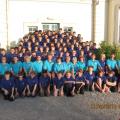
For the past 26 years the Salesian College Year 7 Activity Trip has been held at Derwentwater, with the husband-and-wife team of Gill and Andrew masterminding the trip since 1997.
This year Salesian brought 89 boys to the Lake District, with 62 staying with us, and 27 staying at Borrowdale Youth Hostel. Somehow Gill still had the energy to write a report for us! Here is what she wrote:
‘I love coming up to the Lakes. Every year, after our long journey from Farnborough, we receive such a warm welcome. It is like coming home. Andrew loves the fact that the boys have the freedom to do lots of activities in a safe environment, and it is great to have the lake opposite for all the water activities. There cannot be many hostels that have such an idyllic setting.
The boys who stay at YHA Borrowdale are only there for their meals and to sleep, spending most of their time at Derwentwater, and so we are grateful to Kathy, Dave, Nicola and all the staff for being so welcoming and patient with us! This is a great bonding exercise for the boys as they are fairly new to Salesian and do not necessarily know all of the peers in their year group.
This year the evening activities included tournaments in chess, pool, table tennis, football, tug of war, and bingo, with the Headmaster, Mr Wilson, doing a fine job as bingo master! On the final night there were presentations for standout performances amongst the boys, but it is the staff team who are still defending champions in the football tournament! In the past 2 years the trip has also benefited from the presence of Salesian Chaplain, Fr Pat Sherlock SDB, who says mass for the group on Sunday evening.
Here are some comments from the Year 7 boys:
‘The Lake District trip was a challenging, but really fun experience. I learnt so many new things and took part in many thrilling activities. I will remember this trip for the rest of my life and I hope that the new Year 7s have as much fun as I did’.
‘I really enjoyed the rock climbing. I enjoyed this as we climbed up a real cliff. I also enjoyed this as I was quite scared at first but I overcame my fear and climbed to the top, followed by a difficult abseil down’.
Our Headmaster Mr Wilson is very supportive of this trip for the whole of Year 7, and for most of his 17 years as Headmaster, he has accompanied us for at least part of our stay. He always asks the Year 13 pupils: ‘What was your favourite trip during your time at Salesian?’, and the majority answer ‘The Year 7 Lake District Trip’! We are very sad that Mr Wilson is retiring at the end of this academic year, but we hope he will still pop in to visit us on future Lake District trips’.
We hope so too! Thank you to Salesian for this great report.
June 2014.

On the Dragon Boat racing: 'It was raining the whole time but we didn't care as we wanted to get wet! The scenery was gorgeous and it was great to be out on the water and working as a team.'
Thank you to the Ilkley students for these informative comments. It has been really interesting to learn more about the variety of industry and employment in Cumbria.
Dragon boats, breweries, and a night at Barrow House: sounds like a good AS Chemistry trip! The creative itinerary for the Ilkley Grammar School Sixth Form Chemistry students included visits to Hawkshead Brewery (Staveley), Eastman Chemical Company (Workington), and Pentagon Chemicals Ltd (Workington), studying the real-life use of chemicals, reactions, and processes. The students also got a chance to let off steam, with a very wet session of dragon boat racing on Derwent Water. Here are some comments from the students:
On the visit to Hawkshead Brewery: 'I knew nothing about brewing before my trip to Hawkshead Brewery but I was inspired by the talk, learning all about the importance of choosing the right type and quantity of malt and hops to flavour the beer and control its alcohol content. I'd like to try brewing myself and was interested to hear there is a degree in the subject. I was surprised by how small the premises are given the amount of beer they produce and it was interesting to see the engineering required in batch production like this.'
On the visit to Pentagon Chemicals Ltd (customised chemical manufacturing): 'It was interesting to see how the same techniques we use in the school lab are used in industry in Quality Control and then on a much larger scale to commercially produce chemicals. The level of hazards and risks and how they are managed was quite fascinating. We also found out about careers and degrees in Chemistry and Chemical Engineering, which was useful as we are now applying for university.'
On the visit to Eastman (the Workington site of this international company makes Acetate Tow, a filtration material which is used to produce components such as ink reservoirs for fibre-tip pens): 'There is a whole strand of the Salters A Level Chemistry course called 'Greener Industries' and our visits allowed us to compare things like plant location, batch and continuous production, risk assessment and environment and efficiency in the three companies we visited. Eastman was the only place we visited that uses continuous production and it was interesting to see how the site is engineered to allow this. We also developed a greater awareness of the safety implications of working in a place that uses large volumes of flammable substances and how unused substances can be collected and recycled in the process to increase efficiency’.
On the Dragon Boat racing: 'It was raining the whole time but we didn't care as we wanted to get wet! The scenery was gorgeous and it was great to be out on the water and working as a team.'
Thank you to the Ilkley students for these informative comments. It has been really interesting to learn more about the variety of industry and employment in Cumbria.
July 2014.
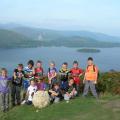
This month we welcomed our first beneficiaries of the DIH Fund, with 12 pupils from Years 3 to 6 enjoying a two-night residential at the hostel. Their visit followed a customised itinerary from our new 360 Education + Adventure programme, and the activities ranged from ghyll scrambling to map symbol Pictionary to Georgian parlour games.
We have included a summary of the Oughterside itinerary here, but next month you will be able to read some of the pupil reviews. Their own words will be much more engaging!
Theme: Team-work and orientation in an unfamiliar environment: working together as one group to explore the geography and history of the surrounding area.
Day 1: Walk to the hostel from Keswick (their coach delivered the baggage!); evening meal; role play to re-enact the history of our Georgian house; take it in turns to lead a walk around the grounds; make a descriptive acrostic poem in the woods; design a folly for Derwent Island; and decorate Georgian gingerbread.
Day 2: Make mini-rafts out of natural materials; paint the view on a giant easel; explore our waterfall and hydro-electric plant; walk on the fells, discuss different land uses, and interact with environmental artists; lunch; ghyll scrambling; evening meal; draw the walking route on an OS Map; learn about scale and map symbols; play map symbol Pictionary; write postcards to a friend; and play Georgian parlour games.
The half day adventure activity (in this case ghyll scrambling) was delivered by our well-established partner Glaramara Activity Centre.
September 2014.
Chapel Primary School have been visiting us for many years, and we are always impressed by their creative programme. This year their activities included environmental art, making papier mache totems (one of their Autumn Term topics is Tribes) and canoeing on Derwent Water. Every day the children added to their journals, and we have included some extracts here. Do you have journals from your school trips?
'Today has been very cold and wet but first for my breakfast I had some toast and beans (it was very yummy) and for my drink I had a cup of tea and some orange juice. After that I got ready to walk up Cat Bells. It was very long but we finally got there. When we got to the top I had lunch: I had a tuna sandwich, a packet of crisps, a banana, and a cake. On the way back I found a pheasant feather. I have enjoyed today: it was really good.'
'Today it was really fun because we went to Derwent Water. When we got there we were briefed how to build a raft and we had 4 barrels and 16 pieces of string and then we had races on them and we came second. After we had done that we put our helmets on and then we were taught how to make a paddle. Next we went canoeing all around Derwent Water: it was really fun. Then we jumped in but I didn’t want to as it was too cold. It was really wonderful today.'
'When we were finished I did some art with Mrs Mills and we did some water colour mixing and some landscape drawing. After that we made story sticks and we went down to the river to collect some bits for our story stick. After that we went gorge scrambling and I got soaked! When we got back we had tea: I had beef lasagne (it was yummy) then we had a disco. It was really fun. I have enjoyed my time in Derwent Water: it is really good.'
October 2014.
.jpg)
In the middle of November, 20 Year 3 pupils from Richmond Hill Primary School (Aspatria) took part in our 360u00b0 Education + Adventure programme, with educational activities in the house and grounds on Thursday afternoon, and adventure activities with Glaramara Activity Centre on Friday morning. Richmond Hill Primary School is the second school to benefit from our DIH Fund (composed of grants from the Cumberland Building Society Charitable Foundation, the Quarry Hill Grassroots Fund, and the Hadfield Trust) and they certainly made the most of the opportunity.
This term the Richmond Hill Year 3 topics include Volcanoes, Rocks and Soil, and Who lived in Britain, and so we took a 500 million year journey through the history of Borrowdale, re-enacting the formation of the Skiddaw and Borrowdale Volcanic Rocks, exploring our waterfall, and learning about the Vikings who settled in Borrowdale.
On Thursday afternoon we were joined by local Viking experts John and Sarah Platt of Plattyplus, and they brought lots of exciting things with them, including shields, clothes, animal skins, grinding stones, and lots of intriguing stories! After a surprise greeting by our costumed leaders, the pupils divided into three groups, completing three different activities throughout the afternoon: these included shield decorations (with chalk and stencils on chalk-board replica shields), grinding wheat, and learning about Viking households and customs.
After waving goodbye to our Viking visitors we learnt about Viking names and their meanings, with each pupil adopting a different name and writing it down in runes (the Viking alphabet). Then we made our names into necklaces and introduced our new selves to each other!
On Friday morning the pupils were due to go ghyll scrambling, but there was too much rain and so they went indoor climbing instead. Then pupils re-lived their experiences by telling Viking-style sagas of their adventures, and it sounds like they had a great time!
The teacher in charge told us 'The children and school staff had a fantastic time at the hostel. The hostel was warm and friendly. The food and choices were amazing. They all enjoyed the different Viking activities as well.' The hostel staff really enjoyed having these well behaved young Vikings to stay!
November 2014.
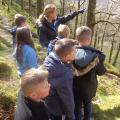
On Monday 27th April 45 Year 4 pupils from Crook Primary School (County Durham) came to stay for a one-night 360 Education + Adventure residential.
The purpose of their visit was to learn about the Vikings who settled in the north of England over 1000 years ago, but we looked at lots of other things along the way. Who can ignore red squirrels, Jays, Spotted woodpeckers, and fell runners when they come to play?!
Our Education Officer, Katy Moore, worked with John and Sarah Platt of Plattyplus to deliver a really exciting two-day programme, and the following summary is just a taster of the adventure, minus the singing, splashes, and secret hiding places along the way.
On the first day we prepared to go back in time, adopting Viking names, and looking at the sailing routes from Norway and Ireland to Cumbria. Proudly wearing our name necklaces, we walked from the hostel to Lodore, where half of the group stayed to do Viking activities with Plattyplus.
The other half carried on walking with Katy, exploring the woodland around the Lodore Falls. We scrambled down to the edge of the falls, and found a wonderful mass of exposed tree roots, forming the perfect theatre for a Viking saga. With great improvisation from the pupils we told the story of King Heidrek the Wise, and when we got to the bit about riddles and rhymes, we wrote down some riddles and prepared to hide them for the next group to find.
Then we walked up a steep and rocky zig zag path to Surprise View, where we could look down on Lodore and see the other group rowing the Viking boat! The pupils were so enthusiastic, and it was really rewarding to hear them take so much interest in the landscape and its history: one boy said that he usually finds walking tiring, but that he felt full of energy and excitement on our route. It was wonderful to hear everyone voluntarily acknowledge the amazing views and talk about their enjoyment of the day.
Once we were back in the hostel grounds the pupils hid the riddles, running all over the woodland, and the other group came back safely from their exciting afternoon with Plattyplus. We all wrote our names in runes, learning the different meanings of the names, runes, and local place names, and then, after tea, we connected our activities with pupils from other parts of the world. Crook Primary School is linked to 5 different schools in Africa (Namibia, Mozambique, Tanzania, Botswana, and Zimbabwe), and so we discussed what we could share and ask those pupils in connection with our trip. Back at school, the pupils will write hostel postcards to their African peers, and some of the great questions were: ‘Do you go on school trips?’, ‘Do you learn about people who lived in your area 1000 years ago?’, and ‘Do you tell riddles?’
On the second day the groups swopped activities, and the walking group did a great job of finding (and answering!) all the riddles. Despite the threat of sleet, and overnight snow on the high fells, we were lucky with the weather, and we had a great time exploring Ashness Beck and admiring the views from Falcon Crag. Lots of the pupils wanted to stay for longer and do more walking (wonderful things to hear!) but hopefully their enthusiasm will last as long as the hills, and who knows who might come back as a school group leader one day?!
April 2015.
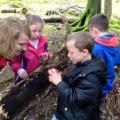
On Wednesday 29th April 50 Year 3 pupils from Ashfield Junior School (Workington, Cumbria) came to stay for a two-night residential, kindly subsidised by a grant from the Quarry Hill Grassroots Grant Fund.
The residential included a full day of activities in the hostel grounds, and the whole day felt like a magical merry-go-round, with five groups rotating around five different activities: Fire, Water, Wildlife, Creativity, and Drama.
The fire-making activity was led by local National Trust rangers Mark Astley and Jessie Binns, and it took place in Strutta Wood, just beyond our hydro-plant shed. Mark and Jessie helped the pupils to prepare three small fires, only using flint and wood, but they toasted marshmallows rather than insects! Both the pupils and teachers were fascinated by the simplicity and satisfaction of the activity.
To investigate the watery aspects of Barrow House, the pupils walked up our waterfall path, learning about its history along the way. They also went over the stone bridge which crosses Barrow Beck, finding the hydro-turbine shed and a great view of Barrow Cascade. Then they made twig view finders, and they used these to sketch a view of the waterfall, with descriptive words around the side.
The wildlife activity was led by Andrea Meanwell from the Cumbria Wildlife Trust. The pupils started by dressing up as a tree, exploring the life that trees support, and then they discussed the special features of the temperate Borrowdale rainforest, looking at the ecology of our valley. This prepared them for a good investigation of the grounds, going out on a mini-beast hunt around the Highclose Coppice area.
The next activity encouraged creativity with raw materials, making pouches out of hessian (fibres from the jute plant), wool, and twig ‘needles’. The pupils were absolutely absorbed by this activity, sewing their pouches in deep concentration. Then they used the pouches to collect twigs, leaves, and other bits and bobs from the grounds, writing descriptions to accompany them, and turning these into acrostic poems. They also decorated the pouches with ink, leaves, and flowers.
Bringing lots of these elements together, the fifth activity used different areas of the grounds to stage an improvised drama, re-enacting the formation of Borrowdale, the arrival of the Vikings, and the building of Barrow House for Joseph Pocklington. The pupils enthusiastically became lots of different characters, and it was great to use the big tree trunk (recently felled and brought to the ground) as a Viking boat
Everyone really enjoyed the water, wildlife, fire, creativity, and drama of the day, and it was great to work with other local organisations. It was particularly rewarding to see the Ashfield pupils embrace the activities so enthusiastically, and they certainly explored our grounds and history very thoroughly!
April 2015.
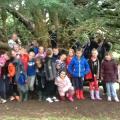
On 4th May, all of the Year 3 and 4 pupils from Westfield Primary School (Workington) came to stay at Derwentwater Independent Hostel for a one night residential, generously subsidised by the Hadfield Trust.
The Hadfield Trust grant enabled the pupils to learn and explore outside the classroom with local experts in their field, including John and Sarah Platt of Platty+, and Barbara Thompson and Phil Cheesley of Classrooms in the Forest.
The Year 3 pupils focused on Plants and the Environment, making the most of the hostel grounds with Phil, while the Year 4 pupils focused on Vikings, walking down to Platty+ at Lodore for an afternoon of Viking activities. Unfortunately it was too wet and windy to take the longboat out on the lake or make an open fire, but the pupils still enjoyed a wide range of activities, from shield design to wheat grinding.
On the second day the Year 3 pupils continued their activities with Phil, while the Year 4 pupils did an exciting Early Settlers session with Barbara, based in the hostel and grounds. Barbara helped the pupils to forage for nuts and seeds, and they made the most of the short season for pignuts, digging up a good crop in the meadow. They also made natural dyes (lots of turmeric involved!) and used this to dye Herdwick sheep’s wool. Then they fried tiddlers from the lake, tried on different types of clothing and animal skins, and looked at uses for different plants and natural materials.
In the evening the pupils wrote postcards to their friends and family, and it was good to see the wide benefits of a residential, beyond the outdoor activities:
‘Today I learnt how to make a bed, table manners, and being patient. I walked up a hill and it was not far until we got to see an enormous waterfall. It was lovely.’ Jessie Grace Johnston.
Thank you to the Hadfield Trust for making possible these formative residential experiences.
May 2015.
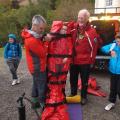
We had a really exciting two days with the Year 3 to 6 pupils from Allonby Primary School. Our theme was Emergencies and we made a great mountain rescue team!
Allonby Primary School (West Cumbria) is very small (22 pupils in total) and so it was interesting to work with a variety of ages and abilities. We are also very grateful to the Quarry Hill Grassroots Grant Fund which subsidised the residential and made it affordable for everyone.
Our theme was really brought to life with a visit from Mick Guy and Martin Bell, both dog handlers with Keswick Mountain Rescue Team (KMRT) and the Lake District Search and Rescue Dog Association. Just as we had finished our introductory session (types of emergencies, different weather conditions and associated hazards, precautions, voluntary rescue services, and the different roles in a mountain rescue team) we saw blue flashing lights, accompanied by a whining siren: our mountain rescue team was complete!
We ran outside to greet Mick and Martin and their dogs Ginny and Isla, and then we had a go at unpacking the KMRT vehicle, looking at the different rucksacks and stretchers. Then the pupils tried a search and rescue exercise: one of the teachers hid in the grounds and, once search dog Ginny had found her, the pupils splinted her leg, helped her on to the stretcher, and carried her back to the hostel. The session ended with lots of good questions, and everyone had a go at sitting in the driving seat of the 4x4. We all learnt so much - thank you to Mick, Martin, Ginny and Isla, particularly as they had been on a big search for two missing walkers on Scafell Pike the night before!
In the afternoon we played 'Pass the Rucksack' to learn about how to prepare for a mountain walk, and then we set off for our own walk, up to Ashness Bridge and Falcon Crag, and down Cat Gill to the lake shore. At several points we stopped to discuss different mountain rescue scenarios, some of which had actually happened in those locations (the mountain rescue incident data is available at http://www.keswickmrt.org.uk/ and in the KMRT annual report booklet), and the pupils demonstrated a keen respect for the challenging nature of our walking environment.
In the evening the pupils wrote thank you postcards to KMRT and played in the grounds, and the following morning they went ghyll scrambling with Glaramara Activity Centre.
We were delighted to read this report from the Allonby Head Teacher, David Owen: 'The KS2 children had a fantastic experience at Derwentwater Hostel this week. The first day was based around the theme of Emergencies and they were able to appreciate the work of the Mountain Rescue Team. Perhaps the highlight given the children’s glowing reports upon return was the Ghyll Scrambling on Wednesday. This presented quite a challenge to the children, who rose to it admirably. I believe that this sense of challenge is what lies at the heart of a residential and it provides an opportunity for the children to discover new things about themselves.'
May 2015.
If a tree falls in a forest, and no one is around to witness it, does it make a sound? This was one of the questions we discussed with the Year 4 pupils from North Lakes School (Penrith), sitting by a tree that was uprooted by a tornado which tore through our grounds in 2012.
The North Lakes programme consisted of 4 different activities: Climbing, Ghyll Scrambling, and Kayaking with Glaramara and Platty+; and a Words in the Woods activity with Katy, exploring trees in the grounds with sight, smell, touch, hearing, and philosophical discussion!
The Words in the Woods activity started with a game of ‘I spy’, using lots of different adjectives and similes. Then we discussed the different senses, moving into a Bat, Tree, and Moth game where one person is blindfolded (the Bat) and everyone else is either a tree or a moth, calling out ‘moth’ or ‘tree’ continuously until the bat has detected all of the moths and ‘eaten’ them. Continuing with the blindfold theme, the pupils took it in turns to smell and feel 6 different natural objects that their partners had collected from the grounds. As they did this, they tried to find similes to describe their sensations. Then they focused on one object and, after returning it to the pile and removing their blindfolds, they tried to identify the object they’d focused on.
Then we discussed the different features of trees, and the pupils helped to create a tree trail, making a features sheet for their chosen tree. This included a rough map to indicate the location of the tree, diagrams and drawings, and written descriptions. We encouraged the pupils to study the features as thoroughly as possible, using all of their senses (apart from taste!).
We concluded the session with a walk up the waterfall path (studying tree features along the way), and a group discussion of our philosophical question, exploring the nature of reality and the importance of our different senses.
It was great to work with the North Lakes pupils, with lots of different ideas and observations, from one child who was really scared of every little insect, but who fascinated everybody when she found a beautiful leaf skeleton and a leathery fir cone, to another child whose father is a tree surgeon (hopefully we had all our facts right!).
June 2015.
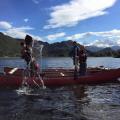
On 18th September 18 pupils from Class 2 (Years 3 – 6) of Oughterside Foundation School (Aspatria, Cumbria) came to stay with us for a one night 360u00b0 Education + Adventure residential, focusing on water management and extreme weather. It was lovely to see some familiar faces from last year, as well as the new Year 3 pupils.
The pupils were full of enthusiasm, and we set off for the first activity (canoeing on Derwent Water with Platty+) in beautiful sunshine, talking about water and tales of adventure along the way. Class 2 are reading Kensuke’s Kingdom by Michael Morpurgo, and so we compared our preparations and activities with those in the book. It so happened that, at the same time, the Fleetwood Nautical and Maritime students were staying with us, doing activities with Plattyplus as well, and so we talked about different kinds of voyages, journeys, and training for adventure.
In Kensuke’s Kingdom Michael and his family keep a log book of their sailing adventures, and the Oughterside pupils used the same template (beautifully illustrated in the book by Michael Foreman) for their own log of the residential, including observational sketches and rough maps.
It poured with rain in the night-time but the following morning was bright and sunny, with fantastic visibility. This was an ideal time to go and look at Barrow Cascade, the waterfall which tumbles through our grounds, and so we went over the stone bridge to the hydro-electric plant shed, where we talked about water and extreme weather. We could see evidence of the damage that a tornado did to the woodland in January 2012, and we discussed the effects of drought during the years that Barrow House was dependent on the beck for its water supply and electricity.
So where does our drinking water come from now? For Keswick and Borrowdale, mains water comes from Thirlmere Reservoir, our destination for Day 2. The pupils looked at Ordnance Survey maps of Thirlmere, and they also found St John’s Beck, which flows out of Thirlmere, down St John’s in the Vale, and through the grounds of Low Bridge End Farm. Then they found the footpaths for our walking route to Low Bridge End Farm.
After a refreshing drink of water, we drove to Thirlmere Dam and walked along the lakeshore path, until a good view of the dam appeared behind us. We talked about the construction of the dam and the reservoir, and the proposal to build a new pipeline to West Cumbria. Then each pupil took a water droplet ‘Fact and Feeling’ card and we shared some facts about Thirlmere and extreme weather in Cumbria. The pupils also tried to think of feelings that might be connected with each fact: for instance, during the construction of the dam, there were about 1000 extra people living in the Thirlmere area and the Manchester Corporation built an encampment of 15 huts for the workers and their families. There were about 33 people in each hut, with very basic facilities. The construction of the dam took 4 years, from 1890 to 1894: lots of feelings to think about during that time!
We then walked from Legburthwaite to Low Bridge End Farm, along a pretty footpath which runs along the west side of St John’s in the Vale. Low Bridge End Farm is part of the Higher Level Stewardship Scheme, providing free group visits, and it has lots of different resources for a wide range of topics. Two of the family farmers, Will and Jamie Chaplin-Brice, were brilliant at tailoring the tour for Oughterside: they showed us some pictures of the farm during the 2009 floods (there is a bridge at the farm which was badly affected by the floods, and which indicates the height that the water reached), and talked about other effects of extreme weather, such as the mini avalanches which come down the steep valley sides of St John’s in the Vale. We also discussed the effect of drought on a busy farm that depends on local springs for its water supply: one of the ways to use less water is to have a compost toilet, and all of the pupils used this with great interest!
We did not have time to do the full woodland trail, but Will and Jamie gave us a good introduction to woodland management, and we had a really interesting tour through some of the different trees and viewpoints. We could have spent ages in the woods, particularly when we came across a big den that some university ‘bush craft’ students had made, but we learnt a lot in a short space of time. It was also very interesting to compare Low Bridge End Farm (an upland sheep and mixed stock farm, with diversification such as accommodation and teas) with the farm that one of the pupils lives on (a lowland arable farm).
Thank you to everyone, and the sunshine (!), for a great two days. Oh, and one of the pupils spotted a beautiful frog near Thirlmere Dam: it even stayed still for a photograph! Some comments from Oughterside:
'We've had fantastic fun in one of the most magnificent outdoor classrooms you'd find anywhere - The Lake District!'
'Great memories for the staff as well as the kids!'
September 2015.
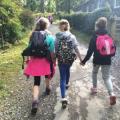
Towards the end of September we welcomed all of the West Lakes Year 7 pupils to Derwentwater - all 230 of them (but not everyone at once)! This residential was generously subsidised by the Hadfield Trust and, with extra support from the school, the trip was completely free of charge for every one of the pupils.
West Lakes Academy is in Egremont (Cumbria) and the purpose of the residential was to help the new Year 7 students 'get to know each other and explore a beautiful location'. During their one-night stay, each form group walked around Derwent Water, completing team-building and nature-based challenges along the way. These included the following: making dens and sculptures from natural materials, drawing maps and writing survival tips for the next group to follow, asking other people where they have come from, discussing how to act in a responsible manner towards the environment, and creating an all-important team name and marching chant.
In the evening they reported back on their tasks, and did some more team activities. The following day they returned to school to do follow-up work connected to the Derwent Water challenges.
Ms Brown, Head of Year 7, commented, ‘The Derwentwater trip was a huge success! We were (mostly!) lucky with the weather and enjoyed the beautiful Lake District views. We took a trip on the ferry across the lake, built dens in the woods, and created our own marching chants. We hold the trip this early on in the school year because we believe it is really important for our new students to have the chance to bond away from the classroom, and to make new friends from other tutor groups.’
There is a report and more photos on their website: http://www.westlakesacademy.org.uk/year-7-derwentwater-trip/
On Monday 25th April 31 Year 4 pupils from Crook Primary School (County Durham) came to stay for a one night residential, focusing on Viking history and its associations with Borrowdale.
One group did activities with Platty+ at Lodore (shield design, home-life and travels, and rowing a Viking-style boat on Derwent Water), while the other group adopted Viking names and went for a walk with Katy. The following day the groups swopped over.
The activities with Katy were based around a walk to Falcon Crag, looking out for Viking words on the OS map along the route (crag, beck, knotts, water, gill, fell etc) and exploring these features close-up. From Falcon Crag there was a fantastic view of the Platty+ Viking boat on Derwent Water, and we all enjoyed playing on Brown Knotts, experiencing first-hand the meaning of the word knott (rocky hill). Some of the children recognised the view from the new Star Wars film!
We also acted out some Viking sagas and scenarios, based around relevant trees in our grounds. By an ash tree we acted out the Norse creation saga, with the ash being the Tree of Life and the source of the first man, Ask. It is even said that a squirrel called Ratasok scampered up and down the Tree of Life, delivering messages between the eagle at the top and the dragon at the bottom, and sure enough a red squirrel appeared for the children!
Under the lime tree we acted out 'The Thing', a Viking community meeting which often took place under lime trees, the Tree of Truth. Disputes and problems were settled at The Thing, and the lime tree helped people come to the truth.
By an oak tree we discussed the long voyages of the Vikings, with oak being an important boat-building material, and we finished by our veteran yew tree, which probably started growing soon after the main period of Viking influence in Borrowdale, with yews often marking the site of Pagan Viking worship.
We concluded our activities by writing Barrow House postcards, signing them in Viking runes: how fluent are the Crook postmen in old Norse? Well done to all of the Crook pupils and their teachers - you really brought the Borrowdale Vikings to life!
April 2016.
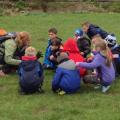
On 27th April 55 Year 3 pupils from Ashfield Junior School (Cumbria) came to stay for a two night residential. They experienced sunshine, sleet, snow, hail and rain, but we still managed to do lots of outdoor activities.
Day 1: a visit to Whinlatter Forest for woodland activities with Classrooms in the Forest (Phil Cheesley and Barbara Thomson). An evening of glorious sunshine, though chilly, with plenty of time to play in the grounds.
Day 2: a full day of activities in the hostel grounds, organised by Katy. The pupils took part in 5 different activities, based on the theme of Trees and Woodland.
The fire-making activity, incorporating discussion of wild fires (very relevant due to two recent wild fires in Borrowdale) and woodland management, was led by Mark Astley and Jessie Binns of the National Trust.
The Wildlife and Woodland activity, using binoculars and magnifying glasses, was led by Classrooms in the Forest. The children were very happy to see Phil and Barbara again.
The Tree Tales activity was led by Katy, with the children (the Ashfield Imps!) travelling through 500 million years of history, improvising aspects of tree-related history and folklore. We started with the native trees, those that grew naturally in Borrowdale after the last glaciation, and finished with some of the non-native trees that wealthy owners of Barrow House introduced from abroad.
The fourth activity was a walk along the waterfall path, learning about the beck and storm damage, sketching the waterfall, and looking in detail at the leaf and bud features of selected trees.
The fifth activity was a poetry activity, with the children learning about Haiku, Kennings and Acrostics. They wrote tree-related poems, laminated them against leaves, and hung them on trees, creating a poetree trail.
At the end of the day we all gathered in the dining to create a Charter for Woodland, Trees and People (an initiative established by the Woodland Trust), discussing the importance of trees, and writing down our tree-related memories and stories. We stuck them on a painting of Derwent Island (the island that Joseph Pocklington bought in 1778, deforesting it to make way for his mansion and follies) and sent a picture of it to the Woodland Trust. By this point the sky was a mixture of rain, sleet, and snow, and the children were happy to play indoors, read stories, and eat a good tea.
Hopefully some of the pupils will find a branch from a beech tree (the Tree of Wishes) on the ground, attach a wish to it, and stick it in the earth for the fairies to consider: a wish for warmer weather for next year’s Ashfield residential would be good!
April 2016.
For as long as Kathy and Dave have been here, pupils from Threlkeld Primary School have been visiting Barrow House, with a tradition of walking to the hostel from school. Now some of those pupils are re-visiting as teachers and parents!
Here is Isla Turnbull (Year 5) with her report of the residential:
As we lined up in front of the school, ready to go, I felt scared and excited. Moments later, we set off towards the unknown. We walked along the road, up past Burns Farm, then up the hill to Castlerigg Stone Circle for a snack. With every step it became hotter so we stopped off at Abby’s Farm for ice cream, where we also ate our packed lunch. After that, we started for Walla Crag but we had to change the course of our hair-raising experience due to static electricity. Having decided a storm was on its way, we quickly hurried down to Ashness Bridge. We stopped for a drink before walking down the road to Derwentwater Independent Hostel.
When we eventually arrived, everyone was hot and sweaty and ready for a shower. When everyone had washed, unpacked and put their sheets on the beds, we headed downstairs for a delicious dinner of bolognaise and then ice cream. After dinner we washed up and walked down the long corridors and into the lounge, where we were read a story whilst slurping hot chocolate and eating marshmallows. After that we climbed up the steep stairs to our soft, warm beds, and I fell asleep the moment my head hit the pillow.
When we woke up, nearly everyone else was awake so we dressed quickly and headed downstairs for breakfast. When we were ready we split into two groups; the younger group did rock climbing first, while we caught the launch to Brandlehow and looked for galena. As well as finding galena and other minerals, we found some lizards and frogs.
During the walk to Shepherd’s Crag for rock climbing, it started raining, then we heard some thunder and it started raining harder. As we swiftly ran to Shepherd’s Crag for lunch and to meet the group (also to get out of the rain), we saw some lightening.
When the rain had stopped and we had eaten all our lunch we hurriedly walked up to the crag. Despite all the rain, the crag was almost dry. We pulled on our harnesses and tied into the rope, ready to climb. Even though the rock didn’t look wet, when you were on the crag some bits felt damp. When we were packing up, it started raining heavily again but it was harder going down because the water was gushing down the path, making it feel like ghyll scrambling.
On the third day we got a bus to Honister Slate Mine. The tour was led by Donald who is an ex-pupil of Threlkeld School. In the mine, we saw lots of slate and an old railway which was used to transport slate out of the mine if it was the right type. We also saw a railway track that went up and up into the hill above.
After the mine, we walked quickly down to the pier to catch the launch back to Derwentwater Hostel. We nearly missed the launch but luckily Mrs Horder made it wait.
On the last day, we walked back to school over Latrigg. Despite all the rain, I had a brilliant residential and a nice stay at Derwentwater Hostel.
June 2016.
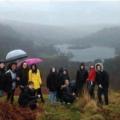
In 1802, on the first Thursday in February, it was ‘a terribly wet day’ in Grasmere, and Dorothy Wordsworth was ‘very sick’ and ‘lay down as soon as breakfast was over’, while her brother William ‘thought a little about The Pedlar’, tiring himself out and sleeping badly. However, despite rainy and snowy days that month, the Wordsworths still walked frequently to Rydal for letters, as well as 'walking backwards and forwards' most days, composing and altering poems.
215 years later it was a ‘rainy morning’ (according to my diary and the keen observations of 55 English Literature students from London), but as soon as breakfast was over we boarded a coach and travelled down to Grasmere, ready to walk to Rydal and White Moss Common along the Wordsworths’ favourite paths. We read sections of The Pedlar and other poems, and compared Dorothy Wordsworth’s journal entries with our modern-day week.
In the morning the Year 13 students looked around Dove Cottage (home to the Wordsworths from 1799 to 1808) and did an Introduction to Romanticism workshop with the Wordsworth Trust Education Officer, while I took the Year 12 students for a walk to John’s Grove, White Moss Common, White Moss Tarn, and Grasmere village. Then we swopped over at lunchtime and I took the Year 13 students for a walk to Rydal Mount (William Wordsworth's home from 1813 until his death in 1850).
On the way to Rydal is White Moss Common, a wild boggy hill with views of Rydal Water and Grasmere, and on the side of the common, overlooking Grasmere, is John’s Grove, named by William and Dorothy after their brother John (a sailor who, ‘by pacing here, unwearied and alone’, wore a path through the grove, like a sailor who paces the deck of his vessel. Quote from The Fir Grove by William Wordsworth).
It was along these paths, in light gusts of rain, that I walked with the Chestnut Grove students, reading from Dorothy Wordsworth’s journal and stopping at points that inspired poems like The Leech Gatherer/Resolution and Independence (White Moss Tarn); The Waterfall and the Eglantine, The Oak and the Broom, and To the Clouds (all on the coffin-route path to Rydal); and The Fir Grove, The Sailor’s Mother, and Beggars (all near John’s Grove). We also walked to Grasmere village to see St Oswald’s Church, where a man came up to me and said that his great grandmother had been in the choir at William Wordsworth’s funeral; the Wordsworth family graves; the rectory where William, his wife Mary, and Dorothy lived from May 1811 to May 1813; and the famous gingerbread shop.
It was a pleasure to accompany the sixth formers on their trip to Grasmere, particularly as most of the students had not been to the Lake District before. The rest of the week consisted of classes in the hostel, led by the Chestnut Grove English teachers, and some quizzes and group poetry performances, as well as some short walks to the lake and Ashness Bridge. The students worked really hard, and I was very encouraged by their enthusiasm and camaraderie: I hope we get more English Literature groups like this! (Katy Moore, DIH staff member. All quotes from The Grasmere Journals by Dorothy Wordsworth).
Here are some extracts from Dorothy Wordsworth’s Grasmere Journals that seemed fitting for our damp but enlivening day in Grasmere:
Monday 16th November 1801. A very dankish misty wettish morning... Mrs O observed that it was beautiful even in winter! We walked backwards and forwards in the church field.
Sunday 13th June 1802. …There was a shower which drove us into John’s Grove before we had quitted our favourite path.
Tuesday 5th July 1802. It was a very rainy day but in the afternoon it cleared up a little and we set off towards Rydale to go for letters. The rain met us at the top of the White Moss and it came on very heavily afterwards. It drove past Nab Scar in a substantial shape, as if going Grasmere-wards as fast as it could go… We walked backwards and forwards on the White Moss path, there was a sky-like white brightness on the lake…Glow worms out, but not so numerous as last night. O beautiful place!
Wednesday 3rd February 1802. A rainy morning. We walked to Rydal for letters, found one from Mrs Cookson and Mary H. It snowed upon the hills. We sate down on the wall at the foot of White Moss. Sate by the fire in the evening. William tired and did not compose. He went to bed soon and could not sleep.
The 55 English Literature students and 4 teachers from Chestnut Grove Academy Sixth Form (South London) stayed with us for 3 nights, travelling by train from London to Penrith. The Year 13 students are studying The Romantic Period for the Poetry Component of the new Edexcel A Level specification and so they were interested to learn about the Romantic poets who visited or lived in the Lake District. The residential was subsidised by our DIH Fund, with free activities and resources from Katy. Here is a link to their school newsletter, with some lovely photos: http://fluencycontent2-
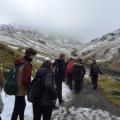
In the middle of March we had an excellent week, with two geography-related groups from Sheffield.
Sixth Form Geographers from All Saints School have been coming to the hostel for many years, studying the coastline at St Bees on their first day and walking the Helvellyn range on their second day, but it was the first visit for the Sheffield Hallam University Environmental Science and Planning department.
The university students stayed for 4 nights, with the first year Environmental Science students learning a range of field work techniques, and the second year Planners applying their studies and work experience to scenarios in Cockermouth, Keswick and Glenridding. It was very useful for the planners and environmental scientists to interact, learning about the application of environmental science to planned human land use, and thinking about the design and rationale for fieldwork. On the last day they worked together more closely, drawing on all aspects of the field course to report on a fictional development scenario in Glenridding.
On the first day the whole group had a talk from two Lake District National Park Authority officers and then some of the students tried our orienteering course. The rest of the week included vegetation surveys on the fells behind the hostel (transects at different altitudes), stream measurements in the Watendlath valley (remaining pretty cheerful despite sleet, snow, hail and rain), ecological studies in the hostel grounds, and a talk about hydropower (focusing on the hostel hydropower scheme) by hostel staff member Katy. Every evening the students worked hard on their field note books, using their data to try out different statistics and analysis, and we hope these studies will be refined and developed annually (or more frequently), building up useful data sets.
We are particularly interested in the ecological studies of Barrow Beck, commencing a year after the repairs to the channel in the wake of Storm Desmond (December 2015). As some of you know, this time last year a section of the Barrow Beck channel, which had been severely eroded in the storms of winter 2015-2016, was cleared of debris and re-lined with stone and soft cement. The students were excited about the opportunity to start a data set ‘from the beginning of something’ and it was interesting to compare the re-lined section with other parts of the channel. Next month we will include some of their findings.
March 2017.
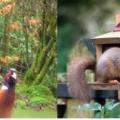
Can anyone find the Douglas fir in our grounds? Is that a male or female duck? What do red squirrels like to eat?
These are some of the questions that Class 2 (Years 3 and 4) from Arkholme Primary School (Lancashire) enthusiastically answered during their one night Habitats-themed residential at the hostel.
On the first day the group of 20 children went to Whinlatter Forest for a session with Phil and Barbara from Classrooms in the Forest, focusing on coniferous forest habitats. Then, on the second day, Phil and Barbara came to the hostel to lead activities in our grounds, focusing on trees and birds. A good array of wildlife performed for us, including a red squirrel, ducks, a red spotted woodpecker, great tits, blue tits, a nuthatch, robins, chaffinches, and a very large pheasant! Together we compared Whinlatter Forest and the Borrowdale mixed woodland, including the semi-ancient natural deciduous woodland in our grounds. We also made badges and postcards, on the Habitats theme of course!
March 2017.
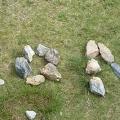
If the oak’s before the ash,
We shall only get a splash,
If the ash precedes the oak,
We shall surely get a soak!
Did anyone notice whether the oaks leafed before the ash in our grounds? Luckily when Allonby came to stay we did not even get a splash, and we hugged lots of leafy oak trees along our way!
On Thursday 18th May, 11 pupils from Years 3 to 6 of Allonby Primary School (Cumbria), came to stay for a one night residential, based on the theme of lakes, Derwent Water in particular of course!
After making their beds and settling in, the pupils went canoeing with Platty+, exploring the southern end of Derwent Water. It was warm and sunny, perfect for splashing about on the lake.
We also had another Cumbrian school group staying, Year 5 from Ghyllside Primary, and it was lovely to see them playing outside with the Allonby children in the evening.
On Friday morning we set out for more explorations of the lake. We started by looking at the meaning of the word ‘Derwent’ (river of oaks); the oak trees in our grounds; the Derwent catchment area and the course of the River Derwent; our route and useful symbols on the OS map and a simplified visitor map; things to look out for on the walk; and a brief history of Derwent Water, ready for some role play on the other side of the lake. Then we walked down to Ashness Jetty, to catch the Keswick Launch to High Brandelhow. On the way to Brandelhow, the Launch stops at Lodore, where Platty+ have their base. It was fun for the children to see where they had been canoeing the previous day.
When we got off the jetty at High Brandelhow, the first task was to find an oak tree to hug; within a short distance there was nearly enough for one each! Then we looked for different cones on the ground, and matched them to the parent trees, identifying Scots pine, Douglas fir, and Himalayan pine. We discussed the difference between deciduous, coniferous, and evergreen trees, of which there is a wonderful variety at Brandelhow.
In a little clearing amongst the Scots pines we discussed the different aspects of the lake: wildlife, uses/activities, inputs, water levels etc, and then we acted out scenes from the history of Derwent Water. We erupted as volcanoes, forming the jagged rocks where the Derwent has its source. Then we became sharp glaciers, deepening the Borrowdale valley. Then we melted into the River Derwent and Derwent Water, with tributary streams flowing down hanging valleys. Gradually, some of us became Vendace fish, one of the first species to emerge after the last glaciation in Borrowdale, and now only found in Derwent Water (and perhaps Sprinkling Tarn and Bassenthwaite). Then two pupils acted out the friendship between St Herbert and St Cuthbert, who died on the same day in 687 AD, with St Herbert living as a hermit on the largest island on Derwent Water. 200 hundred-ish years later, the Vikings arrived, and all the pupils rowed up the River Derwent from Workington to Borrowdale. Then it was time to become German miners, prospecting for minerals on the invitation of Queen Elizabeth I, and living on one of the islands. With the spoil heaps of the old lead mine behind us, and the islands in view on Derwent Water, this seemed particularly real! Continuing with island stories, we acted out some of the eccentricities of Joseph Pocklington, the original owner of Barrow House (our hostel), who also owned Derwent Island in the late 18th century, and then we moved on to Beatrix Potter’s ‘Tale of Squirrel Nutkin’, where naughty Nutkin taunts Old Brown owl on Owl Island (St Herbert’s Island). Using our imaginations, we could see red squirrels rafting across the water to St Herbert’s Island! Then we came up to the present, with pupils becoming launch drivers, kayakers, mountain rescuers, and National Trust rangers.
After that it was time to be ourselves, explore the spoil heaps, and write ‘Allonby’ in pebbles on the grass by Abbot’s Bay. Then we walked round to Manesty, hugging oak trees along the way (so many!) and looking out for cuckooflowers, so named because they are said to flower at the same time as cuckoos begin to call in May. We saw lots of them along the edge of the boardwalk, as well as some bright Marsh marigold.
We stopped by the River Derwent for our packed lunches, looking at the engraving on the bridge (‘Sometimes, if you stand on the bottom rail of a bridge and lean over to watch the river slipping slowly away beneath you, you will suddenly know everything there is to be known’, Winnie the Pooh/AA Milne), and decided that we didn’t really need to go back to school!
We did not have time for poetry by the Lodore Falls, or a game of Duck Duck Goose, but we enjoyed a stroll back to the hostel, in time for a final hug of an oak tree and a re-cap of the residential. I was delighted to hear how much the pupils had absorbed, from the names and folklore of wild flowers, to the best bits of their breakfast!
The Allonby residential was subsidised by our DIH Fund, with free activities from Katy. In the next newsletter we will feature some poems written by the pupils, together with some more photos.
May 2017.
.jpg)
Here is are reports from three of the children on the Newbarns residential:
After a long journey to Keswick we clambered out of the bus to see an amazing hostel with a beautiful garden to look out on when we were in our bedrooms. We dragged our suitcases up to the rooms where we made our beds and made our rooms look tidy with all our suitcases in. Before we had free time, we took all our shoes down stairs and lined them up neatly in pairs. After everyone had finished their meals we all got ready for a walk around the hostel and up to Ashness Bridge. The river underneath the bridge was flowing extremely fast as it had been raining the night before.
I had never stayed in such an old as well as big place before. I was absolutely astonished seeing my room because I was in room one (the very grand old banqueting room) with seventeen other girls. The staff were really helpful. After making the beds and settling in, I went to explore the hostel. I found: the ping pong room, the pool room, the lounge and the very important girl’s toilets. On the first night we discovered that the hostel was close to Ashness Bridge but was quite a fun but tiring climb. When we got back to our temporary home, I was tired out and almost fell asleep instantly. I enjoyed my first day passionately. As well as free time at the hostel we: made shelters, made our own hot chocolate on stoves and enjoyed our meals, a lot. Thank you for letting us come.
Relieved, I got off the bus and grabbed a suitcase and rolled it into the hostel. We went into the lounge and got told where our rooms were. We rushed to them and made our beds. We had some free time and played hide and seek. We then had lunch. Very satisfied, we had more free time (hide and seek) then had tea. We went for a walk to Ashness Bridge and back. Sadly, we went to bed (don't worry teachers, most of us slept, including me).
The following day we caught the launch to Hawse End and walked back to the hostel by following the shore through Portinscale and Keswick. Later on we made fantastic dens with the fantastic trees the front garden had! Then, Mr Laird showed us how to use a stove.
By Luke, Willow and Eden
June 2017.
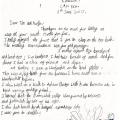
Borrowdale CE Primary School is situated in Stonethwaite, at the southern end of the Borrowdale valley, and we were delighted to welcome all of the KS1 and 2 pupils for a one night residential in May, allowing them to explore 'the big white house' that most of them pass each day.
Our manager Tim, and his partner Aukje, have a child in Year 6 (well, just finished term now!), and our former manager Kathy has been a Borrowdale School governor for a long time. Aukje also helps with after school clubs, and I help with KS1 on Thursday afternoons, so it was lovely to welcome familiar faces and see the children playing and cooperating with each other. Here is a report of the residential:
On Thursday 25th May, in bright sunshine, 36 pupils from Years 1 to 6 of Borrowdale CE School came to stay, enhancing their term topic of ‘Borrowdale’, and developing important skills, from making beds to helping each other pack up in the morning.
They arrived after school on Thursday, in time for a simple meal, followed by a campfire and playtime in the grounds. The children also sang songs that they'd created in a music workshop earlier that day.
On Friday morning the pupils were very organised, packing up their bags and clearing their rooms before breakfast. In fact some of the younger ones were up at 5.45am, but they quietly coloured in pictures of the hostel!
After breakfast the teachers led room inspections, followed by playtime in the sunshine. At 10am Katy led all the pupils on a walk to Ashness Bridge, looking at the hydro-plant and wild flowers along the way. The pupils were interested in the local OS map, identifying Barrow Beck and other features. At Ashness Bridge the KS2 pupils demonstrated their knowledge of local geology and geography, discussing the geological history of Borrowdale, with a good view of Skiddaw and Falcon Crag. All of the pupils have been studying Borrowdale this term, and they were able to identify the difference in rock type between Skiddaw (sedimentary) and Falcon Crag (Borrowdale Volcanic Rock).
After some more discussion about the course of the River Derwent, and the meaning of Derwent (river of oaks), we walked down a little-used path through Strutta Wood SSSI, looking carefully at trees and flowers along the way. Back at the hostel the pupils collected their packed lunches and took them down to the lakeshore, with an hour of paddling and playtime and more discussion about the formation and features of the valley.
After lunch certificates were given out for tidiest room, best manners etc, then all the pupils went off for their usual Friday afternoon PE activity: KS1 to Keswick Leisure Pool for swimming lessons, and KS2 with Glaramara for their adventure activity (climb inside Honister Slate Mine on this occasion).
It was a wonderful end to the week, and we hope to have Borrowdale School to stay every year.
May 2017.





